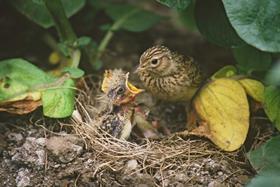
British farmers have been accused of contributing to a sharp decline in biodiversity, with one in seven species facing extinction in the UK.
The annual State of Nature Report, which brings together data from more than 50 organisations including the Royal Society for the Protection of Birds (RSPB), the National Trust and the Marine Conservation Society, claims that intensive farming, urbanisation and climate change have had a destructive impact on a range of habitats, including forests, coastland and hills.
The study found that modern agricultural techniques have played a large role in leaving the UK “among the most nature-depleted countries in the world”, with much of the country now past the point at which “ecosystems may no longer reliably meet society’s needs.”
Of the nearly 8,000 species assessed using the study’s Red List criteria, 15 per cent were found to be threatened with extinction in the UK.
The report listed 10 ways in which the natural world had been affected between 1970 and 2012, including climate change, urbanisation, habitat creation and the draining of wetland areas.
Intensive farming was found to have had by far the most negative impact on wildlife, being responsible for almost 25 per cent of the total damage.
“Over the period of our study, farming has changed dramatically, with new technologies boosting yields, often at the expense of nature,” the report said.
“The intensification of agriculture has had the biggest impact on wildlife, and this has been overwhelmingly negative,” the study’s authors added.
Numbers of Britain’s most endangered animals have fallen by two-thirds since 1970, while more than half of the total number of species is in decline. Insects and other invertebrates, which account for 97 per cent of all animal species, have been badly hit, with 59 per cent of insect species in decline since 1970.
Other species, including farmland birds and butterlies, have been hit by changes to agricultual practices, and harvesting machinery can destroy the nests and young of birds, such as skylarks, and bumblebees, such as carder bees.
There is also evidence that seed-eating birds have declined because of changes to the timing of sowing and harvest, leading to seasonal slumps in seed availability, the report claims.
The National Farmers Union (NFU) dismissed the report’s suggestion that agricultural intensification was harming wildlife, saying that it had been a factor for the last quarter of a century.
NFU Vice President Guy Smith said: “As the report acknowledges, agricultural policies of the past did focus on maximising food production resulting in the intensification of farming in the years after World War II. However, since the early 1990s, in terms of inputs and in terms of numbers of livestock and area of crops grown British agriculture has not intensified - in factit's the reverse.
Smith added: “British farmers have embraced the conservation agenda. They have planted or restored 30,000km of hedgerows, they reserve the borders of their fields to plant wildflowers for birds and bees, they are ensuring cleaner water and they are using less fertiliser and pesticides than ever.
“Greenhouse gas emissions from agriculture have fallen by 16 per cent since 1990. Two thirdsof farmers have signed up for Britain's trail-blazing and world renowned agri-environment schemes.”



